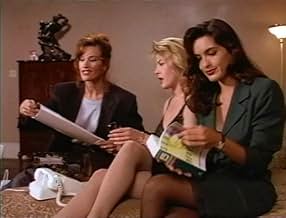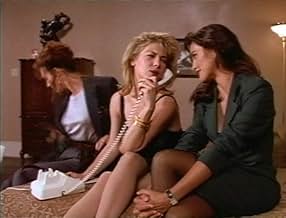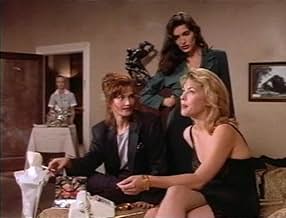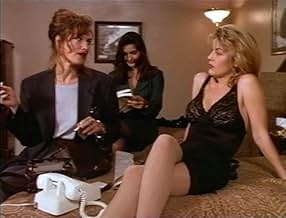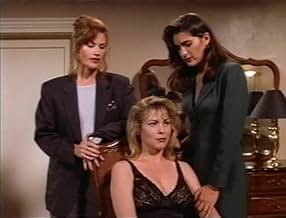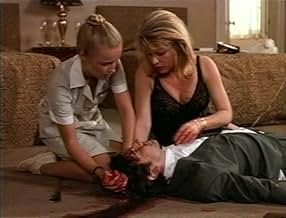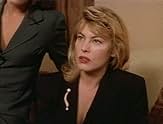Hotel Room
- TV Mini Series
- 1993
IMDb RATING
6.4/10
1.5K
YOUR RATING
Three-part mini-series set during three different eras in a single room of an odd hotel where employees never age. Every story has a slight twist to it, but the stories are mostly dialogue-h... Read allThree-part mini-series set during three different eras in a single room of an odd hotel where employees never age. Every story has a slight twist to it, but the stories are mostly dialogue-heavy psychological or relationship dramas.Three-part mini-series set during three different eras in a single room of an odd hotel where employees never age. Every story has a slight twist to it, but the stories are mostly dialogue-heavy psychological or relationship dramas.
- Awards
- 2 nominations total
Browse episodes
Featured reviews
A very good trilogy of short stories that take place in a hotel room, during 40's and 90's. The second story is not directed by D.Lynch and you as a lynch fan will notice it right away. The first one is very good but the last story takes the price. Very classic Lynch directing. We see the characters many times from a mirror reflection, gives us the "watching" mood as in Blue Velvet and Twin Peaks. The story is dark and very moody. Angelo Badalamentis work haunts in the background. Just beautiful. Recommended. 9 out of 10!!
three filmed plays with equal amounts of character insight, good acting, and run-of-the-mill moments
Three half-hour episodes were produced, two from David Lynch as director and Barry Gifford as writer, one from some random guy, James Signorelli, I never heard of (though, according to IMDb, directed an Elvira movie, and surprisingly helmed Easy Money), each set in a hotel room in a particular year in time:
The first segment, Tricks, set in 1969, is a story of a man (Harry Dean Stanton) right about to get some from a stoned prostitute, who gets visited at that moment by an old white-bearded friend with some dark past history. The acting is good all around, particularly from Stanton during a monologue about his first sexual encounter. But it also doesn't really lead much anywhere, even through touches of Lynch's usual twists (the appearance of the 'friend', the final twist that does cleverly wrap around old relationship ties). It also tries to be funny, and it isn't, which makes it a little awkward when the subtle wit doesn't work. (7/10)
The second segment, Getting Rid of Robby, set in 1992, is like some slightly sleazier, less witty episode of Sex and the City (if you can imagine that), with very lame would-be-clever dialog, and the only redeeming aspect being Griffin Dunne playing a man who's breaking up with a woman who usually 'takes care' of him when he comes by during business trips. Not sure why it was here, even if Badalamenti puts in a groovy jazz song over material that isn't worth it; it's not necessarily a horrible short, but it has no real entertainment value except for people who can't distinguish fake-feminist-trash from quality product, and it is a significant drop in comparison to the other two shorts. (5/10)
Blackout, 1937- Probably the closest that Lynch has come to doing full-on Bergman, via Gifford's script, by ding very simply shot but emotionally complex character studying. Crispin Glover plays a small-town guy who stays in the same hotel room from the other two shorts with his love, played by Alicia Witt, who's sort of slow and affected mind-wise, but has a lot to say about Chinese fish and seeing things like their future children. Witt has a look like the classic Bergman actresses, and the dialog even goes further than Bergman, maybe back to Ibsen, in capturing the tense but always powerfully human tradition of characters who are disconnected from one another, but wanting to be close as possible, through revelations in behavior and stark details. Glover, in a rare instance, plays a guy who is the straight character (straight as possible anyway). In the Barry Lyndon-esquire candle-lit lighting, Lynch makes this all so spare that it seems like the farthest thing removed from an quagmire like Inland Empire. But in its own way, Lynch is experimenting just as much in getting inside the nature of a character's psychology, and it's refreshing to see him let the actors find their own beats in the performances. (9/10)
The first segment, Tricks, set in 1969, is a story of a man (Harry Dean Stanton) right about to get some from a stoned prostitute, who gets visited at that moment by an old white-bearded friend with some dark past history. The acting is good all around, particularly from Stanton during a monologue about his first sexual encounter. But it also doesn't really lead much anywhere, even through touches of Lynch's usual twists (the appearance of the 'friend', the final twist that does cleverly wrap around old relationship ties). It also tries to be funny, and it isn't, which makes it a little awkward when the subtle wit doesn't work. (7/10)
The second segment, Getting Rid of Robby, set in 1992, is like some slightly sleazier, less witty episode of Sex and the City (if you can imagine that), with very lame would-be-clever dialog, and the only redeeming aspect being Griffin Dunne playing a man who's breaking up with a woman who usually 'takes care' of him when he comes by during business trips. Not sure why it was here, even if Badalamenti puts in a groovy jazz song over material that isn't worth it; it's not necessarily a horrible short, but it has no real entertainment value except for people who can't distinguish fake-feminist-trash from quality product, and it is a significant drop in comparison to the other two shorts. (5/10)
Blackout, 1937- Probably the closest that Lynch has come to doing full-on Bergman, via Gifford's script, by ding very simply shot but emotionally complex character studying. Crispin Glover plays a small-town guy who stays in the same hotel room from the other two shorts with his love, played by Alicia Witt, who's sort of slow and affected mind-wise, but has a lot to say about Chinese fish and seeing things like their future children. Witt has a look like the classic Bergman actresses, and the dialog even goes further than Bergman, maybe back to Ibsen, in capturing the tense but always powerfully human tradition of characters who are disconnected from one another, but wanting to be close as possible, through revelations in behavior and stark details. Glover, in a rare instance, plays a guy who is the straight character (straight as possible anyway). In the Barry Lyndon-esquire candle-lit lighting, Lynch makes this all so spare that it seems like the farthest thing removed from an quagmire like Inland Empire. But in its own way, Lynch is experimenting just as much in getting inside the nature of a character's psychology, and it's refreshing to see him let the actors find their own beats in the performances. (9/10)
ARE THE EDITORS SMART ENOUGH TO PICK UP THIS INFORMATION AND MAKE THE CORRECTIONS. Please let me know. David Lynch's Hotel Room does not have the full cast listed, they go to great length to add producers, a lot of crew members but not the significant actors, such as Glenn Headly, and Harry Dean Stanton. Go to these actors IMDb pages and verify, go to Leonard Maltins comments for Headly and verify as well. Can the editors go the extra mile for good customer service, and check with other sources and get the correct information, let us hope so!!! This is a popular DVD because Lynch is such a great director and hard to find at video stores. I'm sure IMDb has other sources to check. You have a great web site but often info is sketchy and you rely on us fans to set the record straight... THANK YOU
This is the worst David Lynch directed film or TV series in existence. There are three different episodes to this horrific video, all revolving around the same hotel room. The three different episodes are set in different times, spanning from the 1940's to the 1990's. Harry Dean Stanton stars in the first and probably the best out of the three. This episode is the strongest of the three, with all the usual twists and turns that you have come to expect out of David Lynch. But the next episode is a horrible hybrid of a day soap opera and any theatre-bound 90's mainstream dark-humored film that we have grown accustom to loathe. Halfway through the last episode I decided enough was enough and ejected the tape while condemning this god-awful movie to Haiti. I hated this film and my favorite film is Blue Velvet. Go figure.
Hotel room is not really a straight David lynch movie, it has three parts, set in different time periods, the first and last are directed by lynch. The first staring Harry Dean Stanton, this part is worth watching for the acting alone, but will be enjoyed by anyone who respects lynch's stylistic film making.
The second part is interesting and has a little creative flair, but is greatly over shadowed by the pieces lynch directs. It's good enough to not fast forword to the third part.
The last part which revolves around a couple stranded in a blackout, is based almost fully on dialogue. David lynch's genius comes out here, little light, and enough weird conversation to keep your mind working during the whole piece.
It's very easy to over look a little gem like this, do yourself a favor and check it out.
The second part is interesting and has a little creative flair, but is greatly over shadowed by the pieces lynch directs. It's good enough to not fast forword to the third part.
The last part which revolves around a couple stranded in a blackout, is based almost fully on dialogue. David lynch's genius comes out here, little light, and enough weird conversation to keep your mind working during the whole piece.
It's very easy to over look a little gem like this, do yourself a favor and check it out.
Did you know
- TriviaBarry Gifford, who wrote 2 episodes on this show, also wrote the book, which David Lynch's Wild at Heart was based on
- ConnectionsEdited from Asymmetrical Productions: Tag (1991)
- How many seasons does Hotel Room have?Powered by Alexa
Details
Contribute to this page
Suggest an edit or add missing content


